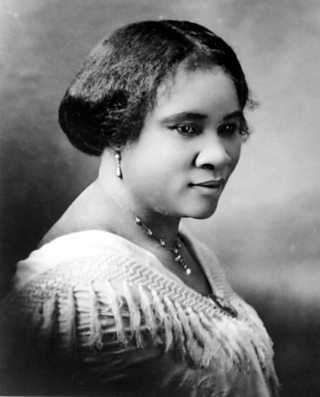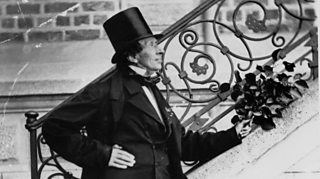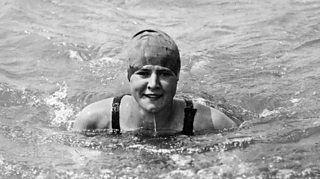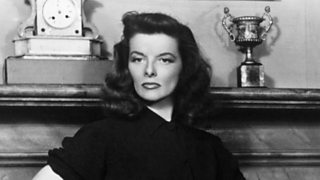How Madam C.J. Walker grew a haircare business and made millions
In the ÃÛÑ¿´«Ã½ Radio 4 podcast History’s Heroes, Alex von Tunzelmann looks at extraordinary true stories from across history of people with purpose, brave ideas, and the courage to stand alone.
Madam C. J. Walker was born Sarah Breedlove, into a Black American family in Louisiana in 1867. Her parents and elder siblings were enslaved until emancipation. She was the first child born free in her family. Thanks to her own extraordinary combination of business instincts and media savvy, half a century later Walker ranked among the most successful and wealthiest businesswomen in the United States.
Her business was both characteristic of her time and strikingly modern. She created hair products and sold them through campaigns centred on her own personality and charisma.
What inspired her to start a business?
Sarah Breedlove grew up on the plantation where her parents and siblings had been enslaved. She was orphaned by the age of seven, lived with her sister, and was put to work as a laundress. She married for the first time aged 14 and had her daughter Lelia when she was 17. She was widowed around three years later. She married a second time, but it didn’t go well. Perhaps, as a result of the stress, she began to lose her hair. This was a common problem for poor Black women at the time: a combination of poor washing facilities, inadequate nutrition and harsh products often caused hair loss.

Walker may not have invented a completely new product, but she invented something even more significant: herself.
She remembered asking God for help. “The story that she told in the press and as she would go around in different speaking engagements was that she had been asleep one night and a big Black man appeared to her in a dream,” says Noliwe Rooks, L. Herbert Ballou Professor in Africana Studies at Brown University. “And when he appeared to her in this dream, he gave her the ingredients for her hair product, the one that was going to cure baldness.”
Why was this controversial?
Sarah Breedlove’s story provoked fury from her fellow Black businesswoman and former boss Annie Turnbo. Turnbo sold her “Wonderful Hair Grower” door to door in St Louis, and trained Breedlove as a sales agent. As Breedlove’s second marriage fell apart, she became close to a newspaper advertising salesman called Charles Joseph Walker. She married him and set up in business in 1906 under the name Madam C. J. Walker, selling her own Wonderful Hair Grower.
Annie Turnbo denounced Walker in a newspaper, saying: “The proof of the value of our work is that we are being imitated and largely by persons whose own hair we have actually grown.” It’s true that both products were based on a formula of petroleum jelly and sulphur. But neither woman invented that: similar products had been in use for generations and could be effective. At first, Walker mixed her own formula in a washtub.
How did she become a celebrity?
Walker may not have invented a completely new product, but she invented something even more significant: herself. She became the figurehead for the Wonderful Hair Grower, with the help of her new husband. “He's somebody who is at the very beginning of understanding commerce, branding, image, and celebrity, and how you turn that into revenue,” says Rooks. She understood that she could reach a huge market by networking through the Black community: she introduced herself to church and community leaders in every state she visited and arranged demonstrations of her Walker System for them.
Rather than advertising her products as many companies did, with images based on white women or showing light-skinned Black women with European features, Walker used herself and her daughter Lelia. It was a revolution in marketing, says Rooks: “from just ‘my product is better’ to ‘my story is better’. She leaned into that sense of celebrity and away from this idea of just ‘I'm a solid businesswoman’.”
What did she offer Black women?
Aside from the products she made – the Hair Grower, shampoo, gloss and salves – Walker recruited and trained Black women as sales agents. At the time, most occupations open to these women were in agriculture or domestic labour. Both could be physically exhausting and dangerous, exposing them to abuse. Becoming a sales agent for the Walker Manufacturing Company instead offered them a measure of independence and dignity. Walker gave prizes out not just to the most successful sales agents, but to those who had done the most for charity. She provided funding for students at Black universities and donated to orphanages, schools and retirement homes.
How rich was she?
Madam C. J. Walker’s success was part of her story but demurely playing it down was part of her brand. She lived lavishly and built herself a 34-room mansion just outside New York. When some of her friends estimated that she was worth a million dollars, she commented: "I'm not a millionaire, but I hope to be some day; not because of the money, but because I could do so much more to help my race." When she died, aged just 51, she left assets worth over a million dollars.
In the 21st century, modern celebrities such as the Kardashians still market their own ranges of beauty products. It’s remarkable to look back on how Madam C. J. Walker worked to create the concept of celebrity-led cosmetics more than a century ago – and to see the enormous global industry it has spawned.
More from History's Heroes
-
![]()
How fairy tales changed the fortune of Hans Christian Andersen
The Danish writer who changed the world of children's stories.
-
![]()
The first woman to swim the English Channel
A nineteen-year-old American woman sets out on an extraordinary feat of endurance.
-
![]()
Why Katharine Hepburn was one of Hollywood’s most unusual stars
Katharine Hepburn takes on the double standards of the Hollywood studio system.
-
![]()
Listen to History's Heroes on ÃÛÑ¿´«Ã½ Sounds
Historian Alex von Tunzelmann shines a light on extraordinary people from across history.





